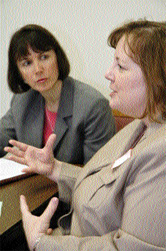 |
 |
|||||
 |
 |
 |
 |
 |
|||
 Susan Doubet (left) and Pam Costner work towards providing faith formation that people will come to—even if they don’t have to. Catholic New World photo by David V. Kamba A regular feature of The Catholic New World, The InterVIEW is an in-depth conversation with a person whose words, actions or ideas affect today’s Catholic. It may be affirming of faith or confrontational. But it will always be stimulating. |
Catechesis starts in the home—for parents and kids
Michelle Martin talks with Pam Costner and Susan Doubet. Catechesis—teaching the faith—has come a long way in recent years, as parishes emphasize it not only for children in religious education programs, but also for young people and adults. But finding ways to reach out that elicit a positive response can prove challenging. One parish that has had success is Sts. Faith, Hope and Charity in Winnetka, which was recognized with a Mustard Seed Award from the National Association of Parish Catechetical Directors and the National Catholic Education Association. The program involves more than 730 students and 242 adults, not counting the more than 435 adults involved in their own activities. Director of Religious Education Susan Doubet and Director of Faith Formation Pam Costner, the former DRE, talked about how they make it work. Susan Doubet: This was a major shift for catechesis: going from child-centered faith formation to being adult-centered, to that really being a focus for the parish. Pam Costner: I think that coming out of Vatican II, the emphasis really became not just knowing our faith so that we can parrot it back. It’s not just about memorization of a concept. It’s about understanding those concepts and owning those concepts. So really we have to help adults to have that mature Christian faith and to help bring them to that. Obviously, that’s the center of everything. The children are learning from their parents. The parents are the first teachers of religion, so to have the parents involved, it helps them deepen their faith, and then they can bring it into their homes. The children aren’t just coming to an hour and listening to us say something to them. They’re also seeing it at home so they can internalize it. SD: The idea with Vatican II is life being dynamic. Things are changing and you’re never going to have a final answer. You’re going to go these different stages in your life. You’re going to hear the story of the Prodigal Son, and you’re going to be the older son at one time and the younger son at another time and the father at another time. That’s the mystery. And bringing all that out, you don’t stop. That’s why we say we’re people on a journey. It’s a journey of faith, and that’s why lifelong learning is so important. SD: A key way is that people do anything for their kids, so being involved in parish programs is a good way to give them tools and say maybe I can bring this into the home. For instance, we use parents to be service project coordinators, which is something Pam set up 10 years ago. It’s something they don’t have to do every week; it’s one commitment every year. We’re telling the parents, you need to help the children make the connection between what they’re learning, the Gospel truths, and what they are doing. So the parent, helping the child figure it out, is able to raise his or her own awareness, and then they can take it into their home. You sneak it in there. PC: Now, with adult formation in our congregation, we are looking at the technological side: how do we make podcasts available, make streaming video available? We’re just trying to see how we can take a look at all that, to see how we can go where all the people are. SD: Catechesis is not just about giving information anymore. It’s an apprenticeship, and when you are apprenticed to someone, you live with them and you learn from the master. Parents need to understand that they are going to be the masters in this relationship, so they need to be living out the Christian life at home, or not. The children will learn that as well, if the parents are not living it out. They will learn that it’s not important to live what I say I believe. PC: There are a lot of adults in formation programs who don’t have children in any program. They have to come out of desire, not duty. Even if they’re coming for something that relates to their children, it has to be something that is really excellent, really worth their time. Once they come and have a good experience, they’ll come back, because it’s feeding them.
The professionalism that is coming to leadership in catechetical ministry is great. Even the catechists are to be working toward certification. |
||
|
|
|||
